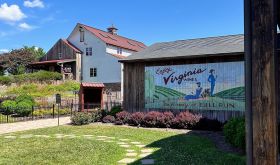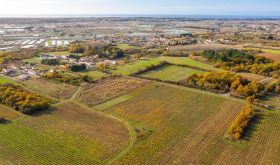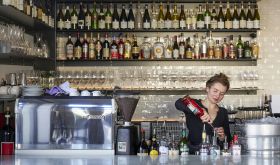My post-Bordeaux 2000 treat was a trip to southern Thailand to meet up with our eldest on her gap-year travels ('do have a little air-conditioning, darling, and a choice of clean towels'). April in Thailand is very hot – high 90s at least – and humid. By no means perfect weather for backpacking but we had a great time in the extremely luxurious, and extremely robustly priced, Rayavadee beach resort (www.rayavadee.com) near Krabi (two flights most days from Bangkok). It's a short boat trip from the town, set in a coconut grove in a national park surrounded by dramatically looming limestone cliffs studded with sweaty rock climbers, and three beautiful public beaches where, if you are that way inclined (and the menfolk of my family are) you can play football and volleyball with the locals as the sun goes down. Of more direct interest to me was the fact that Rayavadee has three perfectly respectable restaurants. The only one serving exclusively Thai food seemed pretty good to me, until we experienced the lunchtime buffet in the Thai restaurant of Bangkok's landmark, the Oriental Hotel which must be one of the food treats, and bargains, of the world. (See A luxurious bargain in Bangkok in nick's food archive for details.) Food in Thailand is by and large absurdly cheap and of very high quality. Lots of delicious seafood, fruit and veg and good meat flown in from Australia mainly. We were extremely wary of tapwater and the backpackers of any sort of salad, although they let me indulge in spiced cold glass noodles. No stomach upsets reported (unlike India).
The best time to visit Thailand apparently is January and February when there is not much rain and the temperatures are more refreshing than later in the year – although November and December can be good too.
My major wine discovery of the trip (apart from an in-yer-face but varietally true Syrah 2000 from the country's leading winery Château de Loei in Phurua in the province of Loei that had surely been made by an Australian) was that crisp dry whites are completely written off by Thai food. Thai flavours tend to be very hot (chillies, ginger) but refreshing (coriander, lemon grass) and often sweet (coconut, peanuts, fruit). Even I have to admit that beer – Singha is the local brew – is pretty good with this sort of food, and at the Oriental I chose a non-alcoholic cocktail based on fresh mango juice that was sublime. But selfless experimentation suggested that relatively blowsy Alsace whites (the sort I might not often choose with European food) worked very well, as did a number of fruity reds. Beaujolais-Villages 1999 from the ubiquitous Georges Duboeuf (wherever I have been in the tropics, he has been too – quite rightly) worked well as did, more surprisingly, a Villa Antinori Chianti Classico 1997. What both these reds have in common is an abundance of fruit. So, when choosing what to drink with Thai flavours and spices, I'd suggest you find the closest vinous equivalent of mango juice.
I can speak with all the confidence of one who has spent precisely a week there, but I have taken very learned counsel from my cousin who has lived in Delhi for the last two years and travelled extensively around the subcontinent. If you are planning the standard Rajasthan itinerary as we did – Delhi- Agra-Jaipur – then February and October are by far the best months. In March is starts to heat up uncomfortably. The monsoon (most years) makes things difficult in July and August. And September is also bakingly hot. Late November to early February can be very smoggy and misty and even according to locals, rather cold – though as a Brit I find that difficult to believe. When we were there in mid Feb every day was gloriously sunny but not too hot, about in the 70s Fahrenheit, not at all humid and yet every evening was pleasantly cool. In fact the only time we were uncomfortably hot the whole time we were there was in the very early hours of the morning in the Delhi airport departure lounge for non Air India passengers where we were told that the air conditioning was switched on only on March 1.
New ZealandNew Zealand is now a seriously good place to eat. (It always had the produce, but for years was a bit too British about how to treat it and cook it.) Cafes, bistros and restaurants of almost relentlessly modern design litter the place, and seem absurdly cheap to people paying in any currency other than New Zealand dollars.
I had an excellent meal at the relatively new Mange Tout in Ponsonby, Auckland's answer to Notting Hill. Another seriously interesting one at the new Zibibbo (named after one of the last entries in my Guide to Wine Grapes with lots of interesting wines available by both glass and bottle. One of the partners had cooked for the Roux brothers in London but you wouldn't have known it. But the best meal of all was at the restaurant attached to Te Awa Farm winery slap bang in the middle of the Hawkes Bay countryside hundreds of miles from any major conurbation. The place was hopping and the resident chef Rick Rutledge-Manning (far too formal a name for the guy) clearly one of the more gifted and aimiable matchers of food and wine on the planet. I remember in particular an Asian spiced duck salad with the most delicious light broth and a tangy salmon filo confection.
Changi Airport, SingaporeIf you are flying to Australia or New Zealand via Singapore's Changi airport at the back of the plane and have a couple of hours in transit, I recommend parting with a few Singapore dollars to take advantage of the showers. Clean hair, brushed teeth and a fresh set of clothes make the second leg of the journey more bearable. Okay, so it means carrying a little more than usual in your hand luggage, but it's well worth it.
Thailand 2After our first trip to southern Thailand, in April 2001, I wrote here that apparently January and February are the best months to visit. In February 2003 Nick, myself and all three children gamely undertook first-hand research into this and had a magical week at Pimalai, another, much newer resort near Krabi, on Ko Lanta island two hours south of the airport.
The weather was indeed slightly fresher (although quite warm enough to be able to use our outdoor bath and shower at any time of day or night) and we even saw the odd rather welcome cloud.
Pimalai was opened in October 2001 by a Thai family and seems to be run, extremely efficiently, by a team of Frenchmen whose combined ages hardly go into treble digits. It's basically a collection of 40 or so very comfortable air-conditioned villas on a tropical hillside sloping down to a 900-metre beach made up entirely of white sand.
To get there requires an hour in a bus and an hour in a speedboat and once you're there there is delightfully little to do, so you need to be in a mood to unwind. 'How do you escape from here?' asked a just-arrived English couple one morning during our stay (fellow guests were from a wide range of European nations mainly, with lots of Italians for some reason). You can certainly go diving with Pimalai's diving school. You can go elephant trekking in the tropical rainforest that covers most of the island. They offer Thai cooking lessons. Or you can sweat it out on the steep dirt roads on one of their bikes. Or you could go on a boat trip (Nick is still talking about his trip with some local fishermen). There's football or volleyball on the beach most nights. But I found commuting between swimming pools and the beach quite enough for me, I'm afraid. Oh, there's a fitness centre of course, but who needs a treadmill when there's that beach?
There are other houses and backpacker haunts on the beach but this is basically the back of beyond. Fortunately therefore, Pimalai's three restaurants are very good and quite absurdly cheap. (The luxurious accommodation is not cheap – although you may be able to negotiate a special package – see their website.) Each of the restaurants offers both Thai and western food, and there's a different buffet each night in one of them. Another is right on the beach so you can eat with your toes in the warm sand which is a joy – while sipping cool young coconut juice straight out of the coconut. Thanks to those young Frenchmen, the wine selection, storage and serving temperatures are exceptionally good for a tropical location and the Thai staff could not be more helpful or charming.
All in all, a great unwind. Good taste, good tastes, minimum formality and zero forced conviviality.
Oh, the spa – I nearly forgot Pimalai's pride and joy. This is a slightly fake but very beautiful 'village' of straw huts in tropical greenery in which Thai maidens do all sorts of extremely restorative, and entirely licit, things to your body.
99 Moo 5 (how on earth it has such a specific address, I cannot imagine, since it completely dominates this small beach), Ba Kan Tiang Beach, Lanta Yai Island, Krabi 81150, Thailand (tel +66 75 607 999)
Bangkok sales office (tel +66 2 320 5500, web www.pimalai.com
This, with Singapore, is the most likely stop on those long, long flights between Australia and Europe. One of Southcorp's team told me yesterday that his flight back to Australia from London last month took 50 – five-zero – hours, thanks to some problem in Bangkok. I hope he took full advantage of the Amari Airport Hotel just off Bangkok airport's Terminal 1. Because of inconvenient flight times to Krabi, we had to spend a night here recently. We were expecting the worst and were extremely favourably surprised.
The public rooms are very classy, the accommodation almost as easy on the eye, and there's a perfectly nice swimming pool in the gardens enclosed by this low hotel so that you are (almost) unaware of the proximity of all those jumbos.
Best of all, the Kinaree Thai restaurant has a really first class buffet every evening 18.00-23.00 and, presumably equally good cooking at lunch (11.30-14.30). It is so keenly priced that we ended up spending almost as much at breakfast in their Zeppelin coffee shop (another help-yourself operation with American, continental and all sorts of Asian breakfasts) open 24 hours a day as we had done for our very lavish dinner.
You don't have to be a resident to eat here. This would make a very welcome taste of real Asian life between planes and it is no sweat to wheel a baggage trolley here.
Amari Airport Hotel
tel +66 2 566 1020, web www.amari.com, email airport@amari.com












